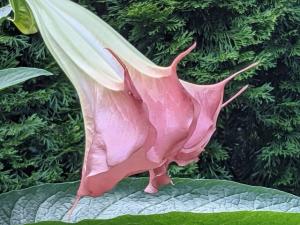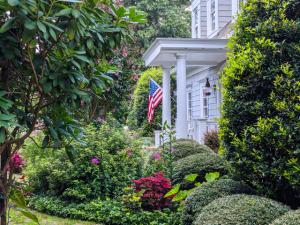Mill Pond Garden to host open garden day Sept. 19
Mill Pond Garden will welcome the Cape May Garden Club Sunday, Sept. 19, to enjoy the beauty of the mature summer/fall equinox garden. The neighbors from across the Delaware Bay will also participate in the annual Milton Garden Club tour of six gardens that day. Proceeds benefit the club’s flower planting projects for the coming year.
An open garden day at Mill Pond Garden is scheduled from 10 a.m. to 12:30 p.m., Sunday, Sept. 19, with tickets available at millpondgarden.com.
A local, professionally staffed, holistic botanic garden created to demonstrate the best plants and good ideas for Cape Region gardens, Mill Pond is a source of both inspiration and horticultural information.
Mill Pond Garden will have reached an opulent level of foliage plants and summer annuals. There will be roses, tall phlox – the longest-blooming pollinator perennial, hibiscus, hardy begonias, liriope including the rare royal purple, and ornamental grasses with inflorescence, most noteworthy being the rare diamond grass. There will also be a good flush of giant, pink-flowered tropical brugmansia, aka angels’ trumpets, a member of the solanaceae family related to tomatoes and peppers.
Part of the art of gardening is strategically choosing plants to provide repeat blooming, or continual bloom or foliage display for changing beauty and interest all year long.
The open garden day will also be a good time to see the large, beautiful gold-and-black garden spider found in hedges and the big web-building barn spider of “Charlotte’s Web” fame. Other sights include frogs, box turtles, and two resident baby snapping turtles, Ally and Snapper, in the stream pond.
Mill Pond Garden is a National Wildlife Federation Certified Wildlife Habitat. Part of its mission is to demonstrate how to offer habitat to wildlife, especially threatened species, and those that benefit the gardens, by providing food, water, cover, places to raise young and sustainable practices. Anyone can create a welcoming haven for local wildlife. Turning one’s yard, balcony container garden, schoolyard, work landscape, or roadside green space into a Certified Wildlife Habitat is fun and easy, and can make a lasting difference.
Because of the resident pollinator plants, visitors may see several kinds of butterflies including black swallowtails, Eastern tiger swallowtais, monarchs, painted ladies, sulfurs and cabbage moths which are actually a type of white butterfly. One may also see some interesting butterfly caterpillars.
Offering water or a pond is part of providing a wildlife habitat, and Mill Pond Garden’s pond includes surviving baby koi fish from this past spring’s breeding time. Recommendations for success with garden pond fish include lots of water plants to filter fish waste and ammonia, keeping the water moving and aerated with a fountain or waterfall, cleaning the pond filter weekly, and, most importantly, feeding the fish only very lightly from June to early October, or even not at all.
Milton’s Pepper’s Greenhouse has fish and never feeds them. Owners of ornamental fish ponds in Japan do not feed their fish, unless breeding them for sale. Most garden pond fish die from overfeeding, crowding and the resulting damage to water quality. The fish can do fine with just algae and the seining of single-celled protozoa, diatoms and fairy shrimp from the fish’s gills.
It’s important not to overstock the fish, as each needs lots of oxygen and space to thrive. Allow one inch of fish length per 10 gallons of pond water maximum. As fish grow bigger with time, one can remove some of the fish or give them away.
A garden pond and fish can be a hugely satisfying experience for the whole family and visitors. The proof is in watching the happy faces.
Editor’s note: This press release has been updated with the correct date.

























































